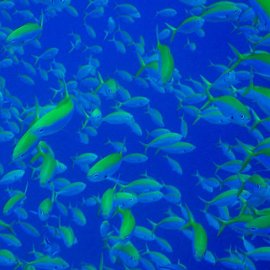Understanding the Value of the Ocean
-
English
-
ListenPause
[intro music]
Welcome to World Ocean Radio…
I’m Peter Neill, Director of the World Ocean Observatory.
In last week’s edition of World Ocean Radio, I discussed an international cooperative project to create a comprehensive picture and profile of the sea floor as a base line resource for further understanding of the world ocean. From that science we derive additional information through expanded, layered perspectives, and that knowledge finds its public expression in different publications and resources often independently conceived and executed, but taken together represent substantive progress in our awareness of the true value of the ocean on which the future of human life on earth will depend.
There are several other key publications and projects that I believe are seminal to the evolution of public policy, ocean science, and analysis of ocean value. The first is The Ocean, Our Future – Report of the Independent World Ocean Commission, published in 1998, the UN Year of the Ocean, in which a group of informed individuals assembled what is, in my opinion, still the best long-term outline of the issues confronting ocean sustainability and governance. The list of recommendations is fundamental, concise, prescient, progressive, and unequalled.
The second is the UN Atlas of the Oceans, a vast encyclopedia of ocean information accumulated by UNESCO, the UN cultural agency, that attempts to integrate all UN resources into a major database, augmented by links to other agencies and organizations. The site remains live, and the value of the resource is enormous, but it is not aggressively maintained and updated. Nonetheless, it contains very specific research and innumerable reports that are of great utility for anyone searching for international ocean policy and oversight from a global inter-governmental perspective.
The third project is the Ocean Health Index, a country-by-country evaluation of all aspects of ocean impacts on the national economy, the result of a multi-year research effort to gather such information according to consistent parameters and metrics that provides an annual “health quotient” number that can be compared with other nations and shift annually as information improves and circumstances change. It is a fascinating endeavor and well worth your interest.
The fourth effort is The Atlas of Ocean Wealth, published in 2016 by The Nature Conservancy, a private, international conservation organization. This report contains a concentrated survey of natural elements that contribute to the well being of civil society, be they marine-protected areas, fishing practices, certain species protections, and the impact of constructive (and destructive) human behavior. What is especially important about this project is its emphasis on “ecosystem services analysis,” that is, an inclusive calculation of the financial implication of the preservation or loss of a particular aspect of the marine world and its correlative economic consequence.
This is a radical new tool for understanding the true value of what Nature provides us in previously unrecognized ways. For example, take coastal mangrove swamps or dune-protected beaches that act as a natural barrier to storm surge. How do you measure or balance in economic terms the profit or loss should these be eroded or filled for waterfront development? When such storms occur we are familiar with the astonishing estimates of resultant costs – in human life, property loss, insurance pay-outs, rebuilding costs, lawsuits and conflict resolution, and the implicit certainty that these expenses will happen again and again as a result of not preserving the natural protection inherent within as a measurable service. Such calculation can produce very interesting alternative argument for certain actions, and are particularly helpful in the analysis in advance of any planned action that would intrude upon environmental resources. The Nature Conservancy is to be congratulated for its investment in this approach when applied to its own actions and those of every other ocean-related proposal still to come.
What follows this approach represents a telling fifth effort: the application of a changing, pro-active, realistically calculated evaluation to guide us in defense of the ocean and its contribution to our well-being, to be incorporated into all development plans and decisions.
Evident here are the core assumptions of an international policy and guide to best practice for the ocean – a principled, insightful plan; a full detailed map of the complete ocean; the aggregation of comprehensive oceanic research, science, and information; an integrated system of measurement of the full spectrum of societal behavior; an inclusive calculation of the ocean’s value in terms of all aspects of human life; and a resultant application of what has been accumulated as a progressive tool for the future.
Those tools are in place. Let’s use them.
We will discuss these issues, and more, in future editions of World Ocean Radio.
[OUTRO MUSIC]
In this episode of World Ocean Radio we discuss publications, reports, and projects integral to the evolution of ocean policy and science, including the Atlas of Ocean Wealth, published by the Nature Conservancy in 2016, which provides a tool for understanding the true value of what Nature provides in previously unrecognized ways.
About World Ocean Radio
Peter Neill, Director of the World Ocean Observatory and host of World Ocean Radio, provides coverage of a broad spectrum of ocean issues from science and education to advocacy and exemplary projects. World Ocean Radio, a project of the World Ocean Observatory, is a weekly series of five-minute audio essays available for syndicated use at no cost by college and community radio stations worldwide.
Image Credit
Biodiversity in the Maldives | Husian, Flikr
Resource from this Episode
Nature Conservancy: The Atlas of Ocean Wealth
- Login to post comments



